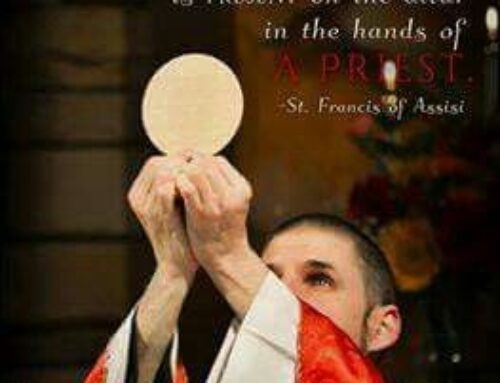(This article originally appeared in the TAU-USA Spring 2025 Issue #115)
Canticle of the Creatures Reflections – Part 1 (Part 2 will be in the Summer TAU-USA issue.)
Part 1 contains 7 articles, pages 5-11
Part 1, pg 5
Most high, all powerful, good Lord,
Yours are the praises, the glory, and the honor, and all blessing.
To You alone, Most High, do they belong,
and no human is worthy to mention Your Name.
“All Creation Sings”
by Fr. John De La Riva, OFM Cap.
Conference of National Spiritual Assistants
 The first time I was introduced to the “Canticle of the Creatures,” I was easily captivated by its seemingly all-encompassing spirit of joy and praise of our good God. Without knowing Francis’ story well nor the context of this canticle’s writing, I imagined him frolicking through a vast field of flowers on a bright summer’s day, without a care in the world. Yes, a moment when the true blessings of the Lord can be so obvious, even to the most tepid of believers. What was this setting of inspiration? What treasure could so captivate St. Francis?
The first time I was introduced to the “Canticle of the Creatures,” I was easily captivated by its seemingly all-encompassing spirit of joy and praise of our good God. Without knowing Francis’ story well nor the context of this canticle’s writing, I imagined him frolicking through a vast field of flowers on a bright summer’s day, without a care in the world. Yes, a moment when the true blessings of the Lord can be so obvious, even to the most tepid of believers. What was this setting of inspiration? What treasure could so captivate St. Francis?
At the writing of the Canticle, St. Francis is about twenty years along his journey as the “Troubadour” of Christ. After a forty-night vigil in the solitude of Mount La Verna, at which time St. Francis received the stigmata, he descended the mountain fatigued from long periods of fasting and penances, all the while burdened with illness and the sting of near blindness.
Coming down from Mount La Verna, he arrived at the dwellings of San Damiano, finding welcome and care from St. Clare and her sisters. Like St. Peter at the Transfiguration, St. Francis came down the mountain transformed with a clearer awareness of his life in Christ – an epiphany, so to speak, that sealed a union with his crucified Lord and with all creation.
There was no longer a divide between the agony and ecstasy of life. Soon, his tired body could not restrain the ecstatic force of his spirit, which felt an overwhelming desire to praise, honor, and glorify God in all his goodness. Touching upon every creature and element of the earth and sky, as if extending a hand of invitation, St. Francis called upon all creation to join in one chorus of praise.
“A voice crying out:” St. Francis, like a true Troubadour, extends a hand of invitation to us to join in dancing and singing praise in all that is preciously unique and universal in our “Pilgrim” experience of life, and to realize in whom we live, breathe, and have our being.
The witness of St. Francis encourages us, in the midst of our own times of trial, dryness, doubt and hesitation, to humbly entrust our lives to Christ. He is our light of Hope. In the timing of God’s Providence, we will find the assurance of Christ, lovingly sustaining and guiding us in all circumstances of life. No longer will the weight of trial or prospect of death have the ability to silence our joy or disrupt our peace.
At the beginning of the Covid shutdown in my neighborhood, there began to arise the sound of a flute. I saw a young man walking pensively down our block playing his simple instrument. He paused, at one point, and looking up, he gave a nod of his head and a smile of encouragement as he continued his stroll on to the streets beyond. He, like Francis, like John the Baptist, was “a voice crying out” with a sign of hope in a desert of testing. In this Jubilee Year of Hope, Pope Francis calls us to be renewed in the hope that is the Risen Christ. Christian hope not only enables us to give due thanksgiving in the abundance of good fortune but to also persevere (and thrive) in praise of God amidst trial and suffering.
Let us, each in our own way, “cry out” and give voice to praise of God in faith, hope and love for our neighbor. Perhaps our “song” of Praise in life will be a melody of encouragement and hope to others along our way.




Leave A Comment